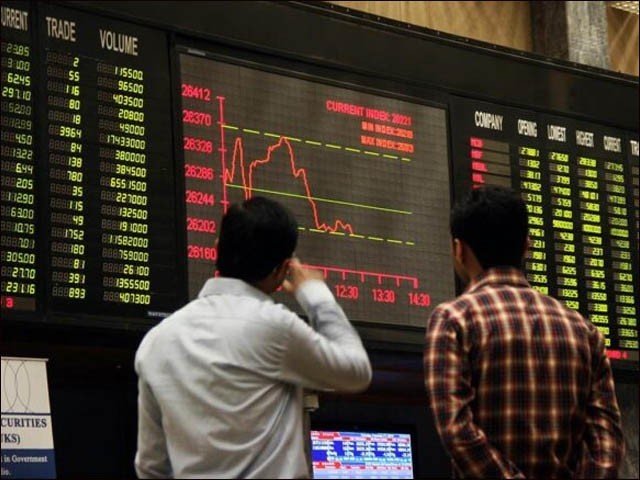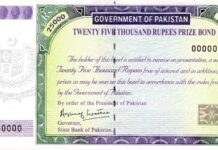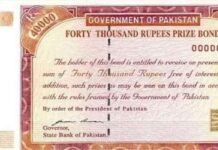پاکستان اسٹاکس کی تاریخ کی چوتھی بڑی گراوٹ
The Pakistan Stock Exchange crashed on Thursday, the fourth-largest recession in history, in which investors sank Rs 332 billion.
The Pakistan Stock Exchange (PSE) crashed on Thursday amid fears of a sharp rise in interest rates. Inflation and rising trade deficit sent investors into a frenzy of selling shares, which plunged the market into its worst slump since the start of trading and pushed the index’s psychological levels to between 45,000 and 44,000 points.
Due to the downturn, 93% of the share prices fell while the investors sank 3 trillion 32 billion 26 crore 74 lakh 75 thousand 411 rupees. With inflation reaching 11.5 per cent in November, the banks offered the SBP a high rate of 10.53 per cent to 11.51 per cent in the auction of three six and twelve month treasury bills. He also suffered a crash as investors feared that the new monetary policy on December 14 would raise interest rates by 150 basis points instead of 50 or 100.
During the trading session, the Hundred Index fell by 2096 points to 43272 points but at 2:15 pm the buying activity at lower prices in certain sectors slowed down due to activity but did not stop in all sectors of the index. The sell-off intensified due to the sell-off, which led to another 2307-point decline, however, buying of certain stocks at lower prices in the closing moments led to a slight decline.
At the close of trading, the KSE-100 Index lost 2134.99 points to close at 43234.15 points, while the KSE-30 Index lost 877.90 points to 16697.96 points, the KMI-30 Index lost 3195.55 points to 69549.76 points and the KMIPSX lost. The index lost 1079.91 points to close at 21075.02 points. The Hundred Index fell 4.62% during the trading session.
If the KSE 30 Index had fallen by 5% during the stipulated regulatory period, the PSX administration could have stopped trading for one hour to save the market from further decline, but after the stipulated period, the 30 Index lost 5.51%. This averted the risk of a possible trade shutdown.
Experts say domestic imports exceeded 8 8 billion in November, while trade deficits exceeded پانچ 5 billion, and current account deficits widened, with potential for a 2.5 to 3 percent increase in the production and business costs of listed companies. The increase will also have a negative impact on their earnings. Therefore, such negative news on the economic front has created an atmosphere of frustration among investors which is why they are opting to withdraw from the market instead of fresh investment in the market which is the worst in the market. Has caused a recession.
The trading volume was 61% higher than Wednesday and a total of 386,753,013 shares were traded while the scope of trading activity was limited to shares of 365 companies. ۔
Among the companies whose share prices rose sharply, Unilever Foods rose by Rs 1,400 to Rs 20,400, Shield Corporation by Rs 19.31 to Rs 293.77, Nestle Pakistan by Rs 171.54 to Rs 5,350 and Rafhan Meez by Rs 124. 9775.
پاکستان اسٹاک ایکسچینج جمعرات کو کریش کر گئی، تاریخ کی چوتھی بڑی کساد بازاری، جس میں سرمایہ کاروں کے 332 ارب روپے ڈوب گئے۔
پاکستان اسٹاک ایکسچینج (پی ایس ای) جمعرات کو شرح سود میں تیزی سے اضافے کے خدشات کے درمیان کریش کر گئی۔ افراط زر اور بڑھتے ہوئے تجارتی خسارے نے سرمایہ کاروں کو حصص کی فروخت کے جنون میں ڈال دیا، جس نے ٹریڈنگ کے آغاز کے بعد سے مارکیٹ کو بدترین مندی میں ڈال دیا اور انڈیکس کی نفسیاتی سطح کو 45,000 اور 44,000 پوائنٹس کے درمیان دھکیل دیا۔
مندی کے باعث 93 فیصد حصص کی قیمتیں گر گئیں جبکہ سرمایہ کاروں کے 3 کھرب 32 ارب 26 کروڑ 74 لاکھ 75 ہزار 411 روپے ڈوب گئے۔ نومبر میں افراط زر کی شرح 11.5 فیصد تک پہنچنے کے ساتھ، بینکوں نے اسٹیٹ بینک کو تین چھ اور بارہ ماہ کے ٹریژری بلوں کی نیلامی میں 10.53 فیصد سے 11.51 فیصد کی بلند شرح کی پیشکش کی۔ اسے بھی کریش کا سامنا کرنا پڑا کیونکہ سرمایہ کاروں کو خدشہ تھا کہ 14 دسمبر کو ہونے والی نئی مانیٹری پالیسی شرح سود میں 50 یا 100 کی بجائے 150 بیسز پوائنٹس بڑھا دے گی۔
ٹریڈنگ سیشن کے دوران ہنڈریڈ انڈیکس 2096 پوائنٹس کی کمی سے 43272 پوائنٹس پر آگیا لیکن دوپہر 2 بج کر 15 منٹ پر بعض سیکٹرز میں کم قیمتوں پر خریداری سرگرمی کی وجہ سے سست پڑ گئی تاہم انڈیکس کے تمام سیکٹرز میں رکا نہیں۔ سیل آف کی وجہ سے فروخت میں تیزی آئی جس کے باعث مزید 2307 پوائنٹس کی کمی واقع ہوئی تاہم اختتامی لمحات میں کم قیمتوں پر بعض اسٹاکس کی خریداری میں معمولی کمی واقع ہوئی۔
کاروبار کے اختتام پر کے ایس ای-100 انڈیکس 2134.99 پوائنٹس کی کمی سے 43234.15 پوائنٹس پر بند ہوا، جبکہ KSE-30 انڈیکس 877.90 پوائنٹس کی کمی سے 16697.96 پوائنٹس، کے ایم آئی-30 انڈیکس 3195.55 پوائنٹس کی کمی سے 694.55 پوائنٹس اور کے ایس ای-30 پوائنٹس کی کمی سے 694.55 پوائنٹس پر بند ہوا۔ انڈیکس 1079.91 پوائنٹس کی کمی سے 21075.02 پوائنٹس پر بند ہوا۔ ٹریڈنگ سیشن کے دوران ہنڈریڈ انڈیکس 4.62 فیصد گر گیا۔
اگر مقررہ ریگولیٹری مدت کے دوران کے ایس ای 30 انڈیکس 5 فیصد گر جاتا تو پی ایس ایکس انتظامیہ مارکیٹ کو مزید گراوٹ سے بچانے کے لیے ایک گھنٹے کے لیے ٹریڈنگ روک سکتی تھی لیکن مقررہ مدت کے بعد 30 انڈیکس 5.51 فیصد گر گیا۔ اس سے ممکنہ تجارتی بندش کا خطرہ ٹل گیا۔
ماہرین کا کہنا ہے کہ نومبر میں ملکی درآمدات 8 ارب ڈالر سے تجاوز کر گئیں جبکہ تجارتی خسارہ پانچ ارب ڈالر سے تجاوز کر گیا اور کرنٹ اکاؤنٹ خسارہ وسیع ہو گیا جس سے لسٹڈ کمپنیوں کی پیداوار اور کاروباری لاگت میں 2.5 سے 3 فیصد اضافے کا امکان ہے۔ اضافے سے ان کی آمدنی پر بھی منفی اثر پڑے گا۔ لہٰذا معاشی محاذ پر اس قسم کی منفی خبروں نے سرمایہ کاروں میں مایوسی کا ماحول پیدا کر دیا ہے جس کی وجہ سے وہ مارکیٹ میں تازہ سرمایہ کاری کے بجائے مارکیٹ سے کنارہ کشی اختیار کر رہے ہیں جو کہ مارکیٹ میں بدترین ہے۔ کساد بازاری کا باعث بنا ہے۔
تجارتی حجم بدھ کے مقابلے میں 61% زیادہ رہا اور کل 386,753,013 حصص کا کاروبار ہوا جبکہ تجارتی سرگرمیوں کا دائرہ کار 365 کمپنیوں کے حصص تک محدود رہا۔ ۔
جن کمپنیوں کے حصص کی قیمتوں میں تیزی سے اضافہ ہوا ان میں یونی لیور فوڈز 1400 روپے اضافے سے 20,400 روپے، شیلڈ کارپوریشن 19.31 روپے اضافے سے 293.77 روپے، نیسلے پاکستان کے حصص کی قیمت 171.54 روپے اضافے سے 5350 روپے اور رفحان میز 1254 روپے بڑھ کر 1254 روپے ہو گئی۔
















